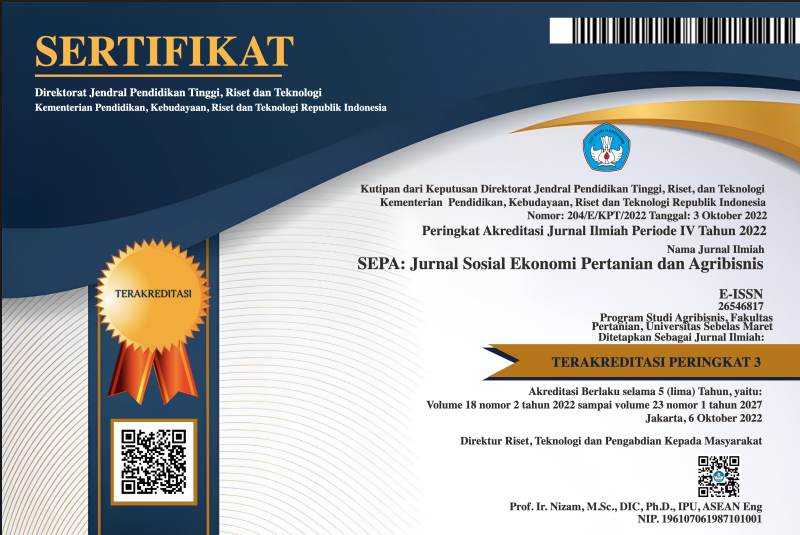PENGARUH PENERAPAN TEKNOLOGI INFORMASI TERHADAP PENINGKATAN KEUNGGULAN KOMPETITIF PADA USAHA KEDAI KOPI DI KOTA BANDUNG
Abstract
Keywords
Full Text:
PDFReferences
Adha, W. M. (2017). Integrasi rantai pasok terhadap kinerja dan daya saing kakao. Jurnal Bisnis Darmajaya, 3(2), 146–162.
Ajami, S., & Rezaee, M. (2016). Effect of information technology on ED’s performance indicators. Journal of Information Technology & Software Engineering, 6(3), 1–5. https://doi.org/ 10.4172/2165-7866.1000181.
Aprilia, A., Laili, F., Setyowati, P. B., Wardana, A. W., & Waringga, K. F. (2020). The effect of environmental uncertainty on supply chain agility for Small and Medium-Sized Businesses (SMBs): Empirical evidence on coffee shops in Indonesia. European Journal of Business and Management, 12(33), 76–83. https://doi.org/10.7176/ejbm/12-33-08.
Ayal, T. W. (2019). Impact of supply chain integration for operational performance, the Case of Amhara Regional State Owned Enterprises. International Academic Journal of Business Management, 6(1), 86–96. https://doi.org/10.9756/iajbm/v6i1/1910011.
Dalimunthe, M. B. (2017). Keunggulan bersaing UKM yang dipengaruhi oleh orientasi pasar dan inovasi produk. Jurnal Konsep Bisnis Dan Manajemen, 3(1), 18–31. https://doi.org/10.33370/ jpw.v20i3.256.
Fawcett, S. E., Osterhaus, P., Magnan, G. M., Brau, J. C., & McCarter, M. W. (2007). Information sharing and supply chain performance: The role of connectivity and willingness. Supply Chain Management: An International Journal, 12(5), 358–368. https://doi.org/10.1108/ 13598540710776935.
Gupta, S., Kumar, S., Singh, S. K., Foropon, C., & Chandra, C. (2018). Role of cloud ERP on the performance of an organization: Contingent resource-based view perspective. International Journal of Logistics Management, 29(2), 659–675. https://doi.org/10.1108/IJLM-07-2017-0192.
Hair, J. F., Hult, G. T. M., Ringle, C. M., & Sarstedt, M. (2014). A Primer on Partial Least Squares Structural Equation Modeling (PLS-SEM). In SAGE Publications (1st ed.). Unites States of America.
Juditha, C. (2020). Dampak penggunaan teknologi informasi komunikasi terhadap pola komunikasi masyarakat desa (Studi di Desa Melabun, Bangka Tengah, Kepulauan Bangka Belitung). Jurnal PIKOM (Penelitian Komunikasi Dan Pembangunan), 21(2), 131. https://doi. org/10.31346/jpikom.v21i2.2660.
Kang, S., & Moon, T. (2016). Impact of information exchange and supply chain integration on supply chain performance. International Journal of U- and e- Service, Science and Technology, 9(7), 237–246. https://doi.org/10.14257/ijunes st.2016.9.7.24.
Kim, M., & Chai, S. (2017). The impact of supplier innovativeness, information sharing and strategic sourcing on improving supply chain agility: Global supply chain perspective. International Journal of Production Economics, 187(May 2016), 42–52. https://doi.org/ 10.1016/j.ijpe.2017.02.007.
Li, S., Ragu-Nathan, B., Ragu-Nathan, T. S., & Subba Rao, S. (2006). The impact of supply chain management practices on competitive advantage and organizational performance. Omega, 34(2), 107–124. https://doi.org/10.1016/ j.omega.2004.08.002.
Lotfi, Z., Mukhtar, M., Sahran, S., & Zadeh, A. T. (2013). Information sharing in supply chain management. Procedia Technology, 11(May 2015), 298–304. https://doi.org/10.1016/j.protcy.2013.12.194.
Marinagi, C., Trivellas, P., & Sakas, D. P. (2014). The impact of information technology on the development of supply chain competitive advantage. Procedia - Social and Behavioral Sciences, 147(June 2015), 586–591. https://doi. org/10.1016/j.sbspro.2014.07.161.
Mashiloane, M. W., Mafini, C., & Pooe, R. D. I. (2018). Supply chain dynamism, information sharing, inter-organisational relationships and supply chain performance in the manufacturing sector. AOSIS, 18(1), 1–15. https://doi.org/ 10.4102/ac.v18i1.547.
Munizu, M. (2017). Pengaruh kepercayaan, komitmen, dan teknologi informasi terhadap kinerja rantai pasokan (Studi kasus IKM pengolah buah markisa di Kota Makassar). Jurnal Manajemen Dan Agribisnis, 14(1), 32–42. https://doi.org/ 10.17358/jma.14.1.32.
Nabila, A. W., & Er, M. (2019). Pengaruh teknologi informasi dalam pertukaran informasi dan integrasi rantai pasok terhadap performa rantai pasok. Sisfo, 08(03). https://doi.org/10.24089/j.sisfo. 2019.05.005.
Naway, F. A., & Rahmat, A. (2019). The mediating role of technology and logistic integration in the relationship between supply chain capability and supply chain operational performance. Uncertain Supply Chain Management, 7(3), 553–566. https://doi.org/10.5267/j.uscm.2018. 11.001.
Otchere, A. F., Annan, J., & Anin, E. K. (2013). Achieving competitive advantage through supply chain integration in the cocoa industry: A case study of Olam Ghana Limited and Produce Buying Company Limited. International Journal of Business and Social Research (IJBSR), 3(2), 131–145. https://doi.org/ 10.18533/ijbsr.v3i2.81.
Pfanelo, N. (2017). Supply chain partnership, collaboration, integration and relationship commitment as predictors of supply chain performance in South African SMEs. Business & Social Sicence Journal (BSSJ), 2(1), 134–168.
Prabowo, H., Abbas, B. S., & Meylianan. (2004). Organisasi terhadap kinerja manajemen Perguruan Tinggi Swasta : Studi kasus Universitas Bina Nusantara. Journal The Winners, 5(2), 114–136.
Pramatatya, V., Najib, M., & Nurrochmat, D. R. (2015). Pengaruh atmosfer kedai kopi terhadap emosi dan keputusan pembelian ulang. Jurnal Manajemen & Agribisnis, 12(2), 126–136. https://doi.org/10.17358/ jma.12.2.126.
Ramadan, Y. S., & Kusumawardhani, A. (2017). Analisis pengaruh manajemen rantai pasokan terhadap performa bisnis (Studi : Pedagang grosir tradisional makanan dan minuman ringan tradisional di Kabupaten Banyumas ). Diponegoro Journal of Management, 6(3), 1–11.
Singh, H., Garg, R. K., & Sachdeva, A. (2018). Investigating the interactions among benefits of information sharing in manufacturing supply chain. Uncertain Supply Chain Management, 6(3), 255–270. https://doi.org/10.5267/j.uscm.2017. 12.001.
Solimun, M., Fernandes, A. A. R., & Nurjannah. (2017). Metode Statistika Multivariat. Malang: UB Press.
Som, J. O., Cobblah, C., & Anyigba, H. (2019). The effect of supply chain integration on supply chain performance. SSRN Electronic Journal, 59(9–10).
Sukatmadiredja, N. R. (2016). Analisa perubahan perilaku konsumen. Jurnal Penelitian Ilmu Manajemen, 2(1), 340–354.
Suryadi, D. (2016). Penerapan sistem informasi manajemen (SIM) dalam Pendidikan Menengah Kejuruan. Konvensi Nasional Pendidikan Indonesia, 1(1), 1–18.
Thatte, A. A., Rao, S. S., & Ragu-Nathan, T. S. (2013). Impact of SCM Practices of a firm on supply chain responsiveness and competitive advantage of a Firm. The Journal of Applied Business Research, 29(2), 499–530. https://doi.org/10.19030/ jabr.v29i2.7653.
Tripathy, S., Aich, S., Chakraborty, A., & Lee, G. M. (2016). Information technology is an enabling factor affecting supply chain performance in Indian SMEs: A structural equation modelling approach. Journal of Modelling in Management, 11(1), 269–287. https://doi.org/10.1108/ JM2-01-2014-0004.
Wijayanti, D. P., & Sundiman, D. (2017). Pengaruh knowledge management terhadap kinerja karyawan (Studi empiris Pada PT. SMS Kabupaten Kotawaringin Timur). DeReMa Jurnal Manajemen, 12(1), 69–85.
Zhu, Q., Krikke, H., Caniëls, M. C. J., & Wang, Y. (2017). Twin-objective supply chain collaboration to cope with rare but high impact disruptions whilst improving performance. The International Journal of Logistics Management, 28(2), 488–507. https://doi.org/10.1108/IJLM-02-2016-0028.
DOI: https://doi.org/10.20961/sepa.v19i1.51628



.png)







.png)
3.png)





